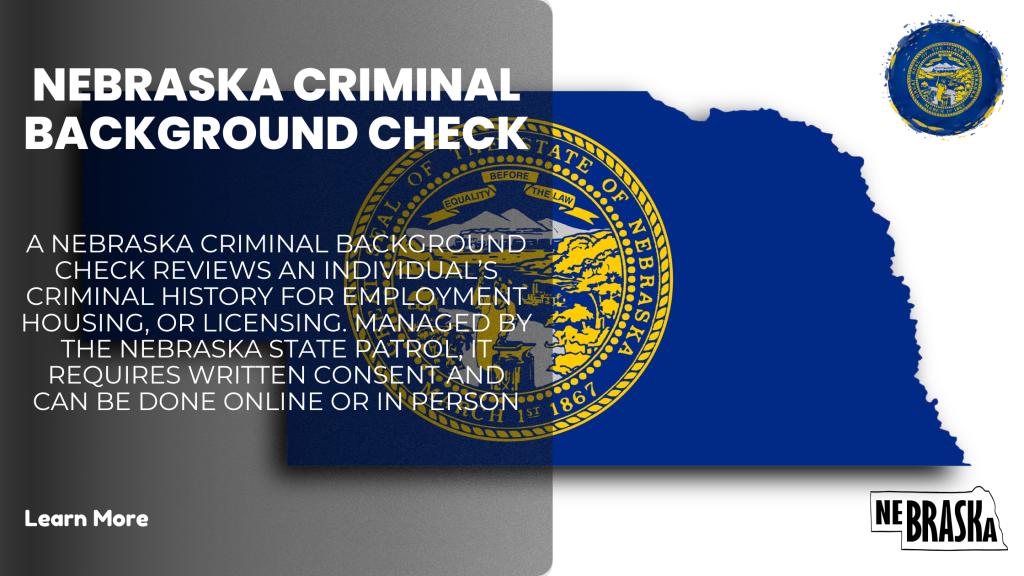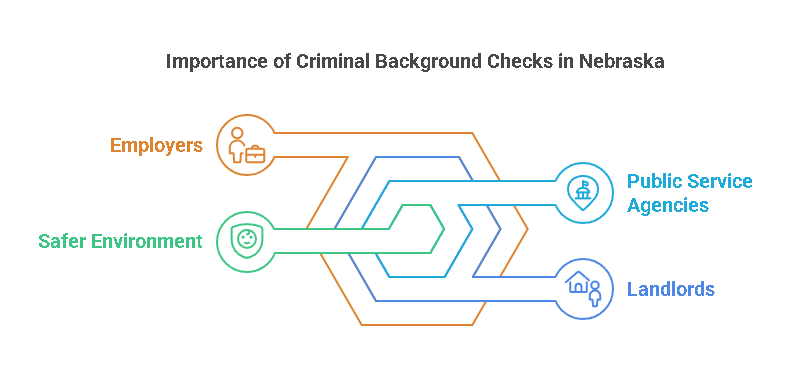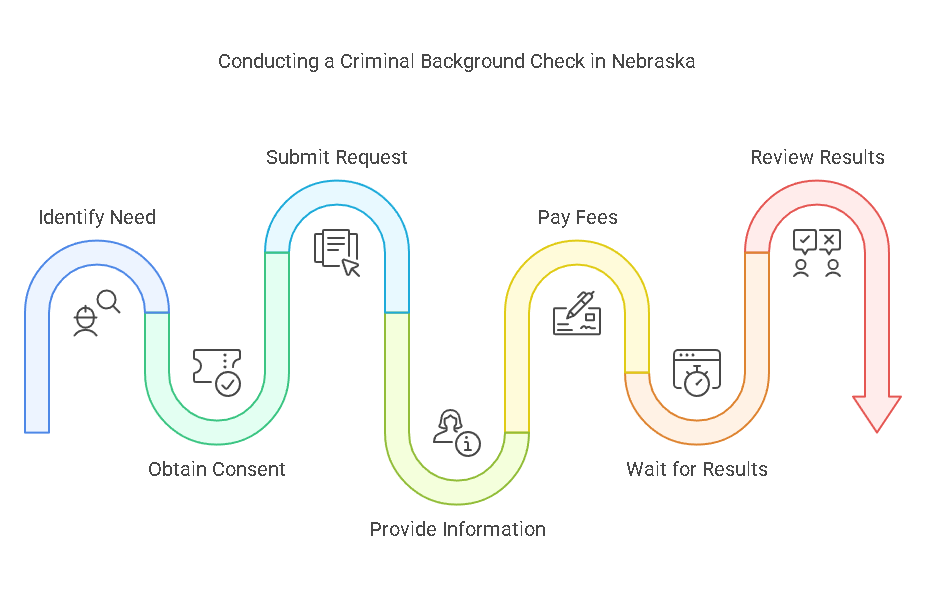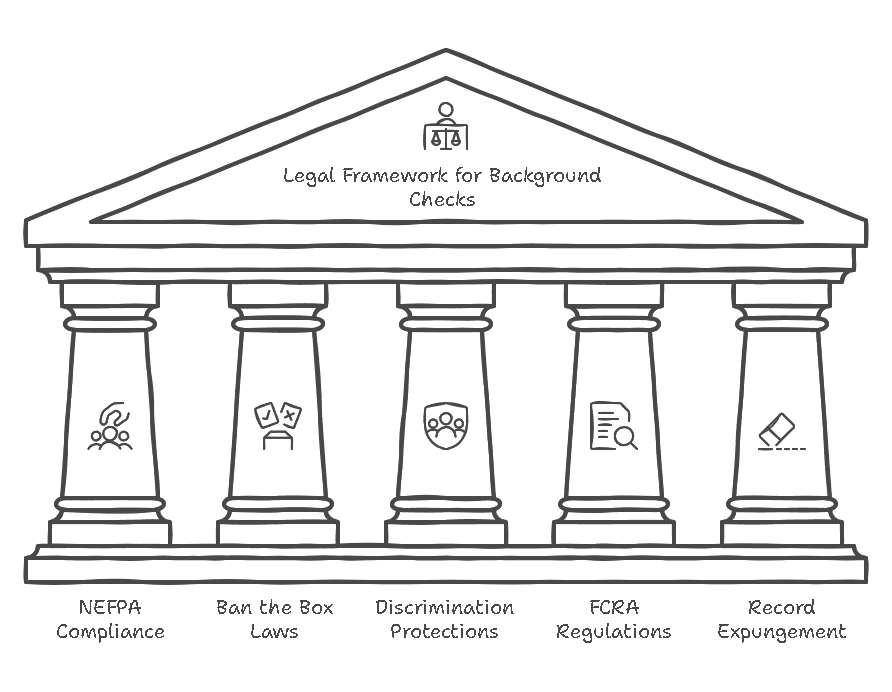Nebraska Criminal Background Check Process Requirements

Introduction to Criminal Background Checks in Nebraska
A criminal background check in Nebraska is a process that allows employers, landlords, and other decision-makers to review an individual’s criminal history to assess any potential risks before making decisions. The check typically includes a review of the person’s criminal records, including arrests, convictions, and pending charges. It is a crucial part of various processes, from hiring employees to renting property and even in certain public service scenarios.
In Nebraska, criminal background checks are especially important for ensuring safety, maintaining compliance with legal requirements, and making informed decisions. The process is governed by both state and federal laws to protect the privacy of individuals while ensuring that the information is used for its intended purpose.
Why Are Criminal Background Checks Important in Nebraska?

Criminal background checks in Nebraska are critical for multiple reasons:
- For Employers: Businesses use criminal background checks to make informed hiring decisions, ensuring the safety of employees and clients, especially in industries such as healthcare, finance, education, and government.
- For Landlords: Property managers and landlords use background checks to assess potential tenants and ensure that they do not pose a risk to the safety or integrity of the community.
- For Public Service Agencies: Agencies may perform background checks to determine eligibility for public assistance, licensing, or law enforcement duties.
By ensuring that only qualified individuals with clean criminal histories occupy positions of trust, criminal background checks help mitigate risk and foster a safer environment for everyone involved.
Who Can Request a Criminal Background Check in Nebraska?
In Nebraska, several entities can request a criminal background check for various reasons. These entities include:
- Employers: Businesses often request criminal background checks when hiring new employees, particularly for roles that require trust or safety-related responsibilities.
- Landlords: Property owners use background checks to evaluate prospective tenants to protect their property and ensure the safety of other residents.
- Public Service Agencies: Government entities may request criminal background checks to determine eligibility for public assistance, housing programs, or licensing.
- Individuals: People can request their own criminal background check to verify the accuracy of the information in the state’s records.
The request process typically involves submitting an application to the relevant state or local agency, which then provides the requested information.
Types of Records Included in a Criminal Background Check in Nebraska
A criminal background check in Nebraska may include several types of records, such as:
- Arrests: Records of any arrests that were made, even if the individual was not convicted of the crime. This information may be accessed if the arrest is still in the public record.
- Convictions: If an individual has been convicted of a crime, this information will appear on the criminal background check. It includes both misdemeanor and felony convictions.
- Pending Charges: Information about ongoing criminal cases, including charges that have not yet been resolved.
- Sex Offender Registry: In certain cases, the background check may include information from the Nebraska Sex Offender Registry if the individual is listed.
It’s important to note that certain offenses may be sealed or expunged from a person’s record under specific conditions, and this information may not always appear in a criminal background check.
Nebraska’s Criminal History Databases
The state of Nebraska operates several databases that are used to maintain and track criminal records. Key sources include:
- Nebraska State Patrol (NSP): The Nebraska State Patrol maintains the state’s primary database of criminal records. It allows employers, landlords, and government agencies to request criminal background checks through the NSP’s Criminal History Record Check system.
- Local Law Enforcement Agencies: Local police departments and county sheriff offices also maintain criminal records for their respective jurisdictions.
- Nebraska Access Management System (NAMS): NAMS is an online platform where individuals and organizations can request criminal background checks. NAMS provides a convenient way to access the Nebraska State Patrol’s criminal record information.
Additionally, private third-party services such as Precisehire offer background check services for businesses and individuals, streamlining the process and ensuring compliance with relevant laws and regulations.
Step-by-Step Process for Conducting a Criminal Background Check in Nebraska

Conducting a criminal background check in Nebraska is a straightforward process, but it involves several key steps to ensure accuracy and compliance with both state and federal regulations. Whether you are an employer, landlord, or individual looking to request a background check, it is important to follow the proper procedures.
Here’s a detailed look at how you can conduct a criminal background check in Nebraska:
- Identify the Need for the Background Check
- Employer Requests: If you are an employer, it is crucial to determine the necessity of the background check for the specific job position. For example, jobs that involve working with children, elderly individuals, or vulnerable populations typically require criminal background checks to ensure safety.
- Landlord Requests: If you are a landlord, you need to establish a clear policy for conducting criminal background checks on potential tenants to evaluate the risk of renting to individuals with criminal histories.
- Personal Checks: Individuals may request their own background check to verify the accuracy of their record, especially if applying for jobs or housing.
- Obtain Consent (if applicable)
- For employers and landlords, obtaining written consent from the applicant or tenant is legally required before conducting a criminal background check. In some cases, failure to obtain consent can result in legal penalties or claims of invasion of privacy. This step ensures that the background check is conducted within the legal framework and that the applicant’s rights are respected.
- Submit the Request to the Nebraska State Patrol (NSP) or Local Agencies
- Nebraska State Patrol: To request a criminal background check from the NSP, individuals and organizations must complete an online request form through the Nebraska Access Management System (NAMS). This platform is the most commonly used system for obtaining criminal history information in Nebraska.
- Online requests are generally quicker and more convenient, with results typically available within a few days.
- Local Law Enforcement Agencies: If the criminal record you need is specific to a certain jurisdiction, you may need to submit a request directly to local police or sheriff’s departments. For example, some offenses may be documented at the county or city level.
- Nebraska State Patrol: To request a criminal background check from the NSP, individuals and organizations must complete an online request form through the Nebraska Access Management System (NAMS). This platform is the most commonly used system for obtaining criminal history information in Nebraska.
- Provide the Required Information
- To process a criminal background check, you will need to provide certain details about the individual, such as:
- Full legal name
- Date of birth
- Address history (in some cases)
- Social Security Number (in some cases)
- Fingerprints (for certain types of checks, such as for employment in sensitive positions)
- The more accurate and complete the information you provide, the more accurate the background check results will be.
- To process a criminal background check, you will need to provide certain details about the individual, such as:
- Pay the Associated Fees
- Criminal background checks in Nebraska typically come with a fee. The cost can vary depending on the type of check requested (e.g., state vs. national check) and whether the request is being processed online or through a local agency. On average, fees for a criminal background check in Nebraska range from $10 to $20 for basic checks.
- Some specialized checks, such as those for employment in government or healthcare fields, may incur higher fees due to the inclusion of additional records or fingerprinting.
- Wait for Results
- Processing Time: The processing time for criminal background checks in Nebraska can vary depending on the type of check, the agency handling the request, and the volume of requests. Generally, online requests via NAMS are processed within 1 to 3 business days. Requests submitted to local law enforcement agencies may take longer, particularly if additional information is needed.
- Types of Records: The background check results will typically include information regarding any arrests, convictions, pending charges, or incarcerations. However, it’s important to note that some records, such as those that have been expunged or sealed, may not appear on the report.
- Review the Results
- Once you have received the criminal background check results, it is essential to review them thoroughly for accuracy. If you are an employer or landlord, it is important to evaluate the information in the context of your hiring or rental decision, making sure to comply with all relevant laws regarding criminal history use.
- If any discrepancies or inaccuracies are found in the report, the individual can challenge the findings with the relevant agency.
Cost of a Criminal Background Check in Nebraska
Here is a breakdown of typical fees associated with criminal background checks in Nebraska:
| Type of Check | Cost Range | Processing Time |
|---|---|---|
| State Criminal Background Check | $10 – $20 | 1 – 3 business days |
| National Criminal Background Check | $25 – $50 | 3 – 5 business days |
| Fingerprint-Based Check | $20 – $40 (or more) | 1 – 3 weeks |
| Expedited Processing | Additional fee | Same day to 1 business day |
Public Records Access and How to Check Your Own Criminal Record
In Nebraska, individuals can check their own criminal record for free or for a nominal fee by accessing public records through the Nebraska State Patrol’s Criminal History Record Check system or by contacting local law enforcement agencies directly.
While you have the right to access your own record, employers, landlords, and other entities must obtain your consent before requesting it on your behalf.
Nebraska Access Management System (NAMS)
The Nebraska Access Management System (NAMS) is the primary online platform for requesting criminal background checks in the state. Through NAMS, individuals and organizations can obtain state-level background checks and request access to criminal records maintained by the Nebraska State Patrol. The platform allows for easy and secure submission of requests, payment of fees, and receipt of results.
Limitations of Criminal Background Checks in Nebraska
While criminal background checks in Nebraska provide valuable information, it is important to note that they are not exhaustive. Some limitations include:
- Expungement and Sealing of Records: Under certain circumstances, individuals may have their criminal records expunged or sealed. This means that the records will no longer be available in a criminal background check.
- Pending Charges: A criminal background check may not always reflect charges that are still pending, which could lead to an incomplete picture.
- Limitations on Use of Certain Information: Nebraska law imposes restrictions on how certain criminal history information, such as arrests without convictions, can be used in decision-making processes like hiring or housing.
Precisehire: Streamlining Criminal Background Checks for Nebraska Businesses
At Precisehire, we specialize in helping businesses, organizations, and landlords conduct criminal background checks that are both thorough and compliant with all relevant laws and regulations in Nebraska. Our platform simplifies the background check process by offering quick results, reliable data, and assistance with navigating complex legal requirements. We help ensure that employers and landlords can make informed decisions while maintaining compliance with privacy laws and tenant rights.
Legal Aspects of Criminal Background Checks in Nebraska

Conducting criminal background checks in Nebraska is governed by several important laws and regulations designed to protect the rights of individuals while ensuring fair and lawful decision-making for employers, landlords, and other entities. Below are some of the key legal aspects to consider:
1. Nebraska Fair Employment Practices Act (NEFPA)
- The Nebraska Fair Employment Practices Act prohibits discrimination in employment based on certain protected categories, such as race, color, national origin, religion, and sex. Regarding criminal background checks, Nebraska employers must comply with the ban the box law, which restricts employers from asking about criminal convictions on job applications before a conditional offer is made. This law is intended to give applicants with criminal histories a fairer chance at being considered for employment.
2. Ban the Box Laws
- Nebraska has adopted Ban the Box laws that limit when an employer can inquire about an applicant’s criminal history. Under these laws, employers cannot ask about criminal records on the initial job application. However, they may inquire about criminal history later in the hiring process, such as after a conditional job offer has been extended. Employers must also comply with the Fair Credit Reporting Act (FCRA), which governs the use of background check reports in employment decisions.
3. Discrimination Laws in Nebraska
- Discrimination laws in Nebraska ensure that individuals with criminal records are not unjustly discriminated against when applying for jobs, housing, or other opportunities. If an employer or landlord uses criminal history as a basis for denial, they must ensure that the decision is related to the specific role or housing and not based on discriminatory motives. For example, a criminal record should only be considered if it is relevant to the duties of the job or the safety of the property.
4. Fair Credit Reporting Act (FCRA)
- The Fair Credit Reporting Act (FCRA) is a federal law that governs how background check information, including criminal records, is collected and used in decisions related to employment. Under FCRA, employers and landlords must:
- Obtain written consent from the individual before conducting a background check.
- Inform applicants if a criminal record will be used to deny employment or housing.
- Provide applicants with a copy of the background check if they are denied a position or housing based on the results.
- Allow applicants the opportunity to dispute inaccurate or incomplete information.
5. Expungement and Sealing of Records
- In Nebraska, certain individuals may be eligible for the expungement or sealing of their criminal records, which means the record is no longer accessible to the public or potential employers and landlords. Expungement may be available for those with minor offenses, cases where charges were dropped, or for people who have completed certain rehabilitation programs. Criminal records that have been expunged or sealed cannot be used against an individual during a background check, and they are not considered in hiring or rental decisions.
6. Nebraska’s Public Records Law
- Under Nebraska’s public records law, criminal history records are considered public records, but with limitations on access. Some records are sealed or expunged, and certain restrictions are in place regarding who can access these records and for what purposes. For instance, employers may access criminal history records for hiring purposes, but the use of certain types of information, such as arrests that did not lead to convictions, may be limited or prohibited under state law.
Frequently Asked Questions (FAQs)
What information is included in a Nebraska criminal background check?
A Nebraska criminal background check typically includes information such as:
- Arrests
- Convictions
- Pending charges
- Incarcerations
- Any relevant details maintained by state or local law enforcement agencies However, expunged or sealed records will not appear on the report.
How can I request my own criminal background check in Nebraska?
Individuals can request their own criminal background check through the Nebraska State Patrol or the Nebraska Access Management System (NAMS). Requests can be made online, and individuals may need to pay a small fee for the service. You will need to provide basic information like your name, date of birth, and possibly fingerprints, depending on the nature of the check.
Can a criminal record affect my job application in Nebraska?
Yes, a criminal record can affect your job application in Nebraska. However, employers must follow specific guidelines, such as waiting until after a conditional offer is made before asking about criminal history. Under Nebraska's Ban the Box law, employers cannot ask about criminal history on job applications. They must also comply with federal regulations, including the FCRA, to ensure that the use of criminal records is fair and justified based on the nature of the job.
How long do criminal background checks take in Nebraska?
The processing time for criminal background checks in Nebraska can vary. Online requests through the Nebraska State Patrol typically take 1 to 3 business days to process. However, checks involving local jurisdictions or more complex requests, such as fingerprint-based background checks, may take longer—typically up to 3 weeks.
What happens if I have a criminal record in Nebraska and my background check is denied for a job or rental application?
If your background check results in a job or rental application denial, you have rights under both Nebraska state law and federal law (specifically, the FCRA). You are entitled to receive a copy of the report and may dispute any inaccuracies or incomplete information. If the criminal record was the reason for the denial, the decision must be justified based on the relevance of the offense to the specific job or rental situation. Nebraska law also provides protections against unfair discrimination based on a criminal record, and you may be able to seek legal recourse if the decision appears to be discriminatory.
Conclusion
Criminal background checks in Nebraska play an essential role in protecting public safety, ensuring fair hiring practices, and fostering transparency in rental decisions. For employers, landlords, and individuals, understanding the rules and regulations surrounding criminal background checks is crucial for ensuring compliance with state and federal laws, as well as safeguarding the rights of applicants.
Whether you are an employer looking to hire qualified candidates, a landlord screening potential tenants, or an individual seeking to verify your own record, it is important to follow the proper steps to obtain criminal history information and ensure that your decision-making processes are lawful, fair, and non-discriminatory.
By adhering to Nebraska’s legal framework for criminal background checks, you can help ensure that your hiring or rental decisions are based on accurate information while also avoiding potential legal issues down the road. Additionally, services like Precisehire can help streamline the background check process and provide you with reliable, compliant results that meet your specific needs.
